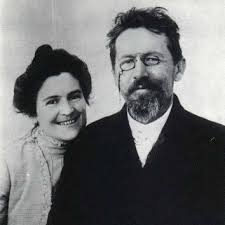It’s taken me a year or so to read through the love letters exchanged by Anton Chekhov and Olga Knipper, his lover, wife, and widow. They are clearly not letters to be published, in contrast to many other “private” letters, and much of the time they seem trivial, containing little but accounts of the weather and expressions of love and exasperation; but they provide an oblique view into one of the great theatrical love affairs.
Chekhov was 38 when he came to admire and take up with the 30-year-old Nipper. She was an actress, and he saw her perform in several plays and thought her under appreciated. Subsequently he wrote for her the parts of Masha in Three Sisters and Ranevskeya in The Cherry Orchard. She was Masha sometimes in her life and letters, and she was Masha for the Russians of her generation. At the age of 80, nearly 50 years after Chekhov’s death, she could not stop herself while in the audience from speaking some of Masha’s great lines before the actress on stage.
Their letters stem from them mostly being apart during the five years of their relationship before Chekhov died of tuberculosis in 1904. She was mostly in Moscow acting every night; he was in Yalta, his “hot Siberia,” on the orders of his doctor. Their letters reach a passionate crescendo as they approach being together and then become silent when they are together.
Chekhov’s letters are mostly light, flippant, and teasing. He calls her doggie, baboon, granny, cricket, sperm whale, and little German (her parents were Germans who became Russian citizens). Almost every letter includes a reference to the weather. He complains about the difficulties of writing but shies away from anything serious and emotional. Her letters are much more intense, describing how she can move from exultation to despair in moments. She longs to see him. He is cooler, but that, I think, is his natural reserve and diffidence not lack of love for Knipper.
The editor and translated of the letters, Jen Benedetti, explains how Chekhov effectively lived in a ménage a trois. Most of the time he was with his sister, Masha, who cared for him constantly. Knipper was, Benedetti argues, more like a mistress than a wife: she and Chekhov met rarely, and their time together was intense and passionate; but Masha was there every day for her brother. At one point Masha, who clearly resented Knipper, a feeling that was mutual, wrote to Knipper telling her to back off. Knipper was furious and upset, as her letters show; but Chekhov avoided the discomfort, even to the point of lying.
Chekhov and Knipper write a lot about the theatre, and the letters will be of most interest to devotees of the theatre, particularly those intimate with Chekhov’s plays. It was an actor friend who urged me to read the letters. Chekhov gives little way about his writing, except that it’s hard, but he does ask Knipper about reactions to his plays and news of her performances. He saw few performances of his own plays. She describes to him reactions to his plays, but not away with complete honesty. She describes her theatrical life, much of it with Stanislavski, including both her excitement and exhaustion. She felt permanently guilty that she was putting the theatre before her marriage, but I think that he was happy with the arrangement.
A great many of the letters describe the frustrations of trying to communicate by letters over such a long distance at the beginning of the 20th century. Letters took days to reach their destination and didn’t always arrive in order. Letters crossed, and I was reminded of ringing home from New Zealand in 1978 and struggling to adapt to the long gaps between words. How different now with texting, Whatsapping, and even old-fashioned email.
Knipper was with Chekhov in Germany when he died and describes his death in her memoir. He’d become progressively more breathless, and the doctor who was called injected with camphor and ordered champagne. (Oh for those days to return.) “Anton took a full glass, examined it, smiled at me and said: ‘It’s a long time since I drank champagne.’ He drained it, lay quietly on his left side and I just had time to run to him and lean across the bed, and call to him, but he had stopped breathing and was sleeping peacefully as a child…”
After Chekhov’s death Knipper continued to write letter to him for two months. “At last I’m able to write to you, Anton, my dear, my sweet, so near and yet so far….As I write to you, I feel you are alive, out there somewhere, waiting for a letter. Dearest Darling, my sweet love, let me speak words of tenderness, let me stroke your soft silky hair, and look into your dear, shining, loving eyes.”
